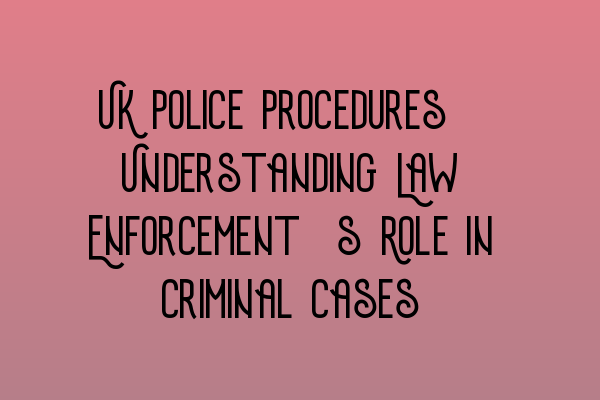UK Police Procedures: Understanding Law Enforcement’s Role in Criminal Cases
When it comes to criminal cases in the UK, understanding the role of law enforcement is crucial. The police play a vital role in investigating crimes, gathering evidence, and ensuring the protection of the public. In this blog post, we will delve into the procedures followed by the police in criminal cases, shedding light on their investigative powers and responsibilities.
Investigation and Gathering Evidence
One of the primary roles of the police in criminal cases is to investigate the alleged crime thoroughly. This process involves gathering evidence to establish the guilt or innocence of the accused. The police have the authority to conduct searches, seize and analyze evidence, and interview witnesses.
During the investigation, the police may apply various techniques, such as conducting surveillance, examining CCTV footage, obtaining search warrants, and collecting forensic evidence. These procedures are designed to build a strong case that can be presented in court.
To ensure fairness and transparency, the police must follow strict guidelines while collecting evidence. Any evidence obtained unlawfully may be excluded from court proceedings, as it violates the accused person’s rights.
Arrest and Detention
If the police have reasonable grounds to suspect an individual of committing a crime, they have the power to arrest that person. The arrest can take place with or without a warrant, depending on the circumstances.
Once arrested, the police can detain the suspect for a specific period for questioning and further investigation. It is important to note that suspects have specific rights during detention, such as the right to legal representation and the right to remain silent.
The length of detention may vary depending on the seriousness of the offense. The police must regularly review the necessity and lawfulness of the continued detention to ensure it remains justified.
Charges and Bail
After the investigation and questioning, if the police believe there is enough evidence, they can charge the suspect with the alleged crime. The charge signifies that the police believe there is a case to answer and that the matter will proceed to court.
However, in some cases, the police may release the suspect on bail while further investigations are conducted. Bail can be granted with or without conditions, such as regular reporting to the police station or restrictions on travel.
If the police do not have sufficient evidence to charge the suspect, they may release them without charge. However, it is important to note that releasing without charge does not necessarily indicate innocence.
Working with Other Criminal Justice Agencies
The police work closely with other criminal justice agencies, such as the Crown Prosecution Service (CPS) and the courts, to ensure that the criminal justice process runs smoothly. The CPS is responsible for reviewing the evidence gathered by the police and deciding whether to prosecute.
Once a case reaches court, the police play a crucial role in presenting the evidence and assisting the prosecution in building a strong case against the accused. They may also be required to provide witness testimony or expert opinions, depending on the nature of the case.
Conclusion
Understanding the role of law enforcement in criminal cases is essential for both legal professionals and the general public. The procedures followed by the police in investigating crimes, gathering evidence, and working with other criminal justice agencies form the foundation of a fair and effective criminal justice system.
If you’re interested in learning more about the SQE (Solicitors Qualifying Examination) and preparing for your career in criminal law, be sure to check out our related articles:
